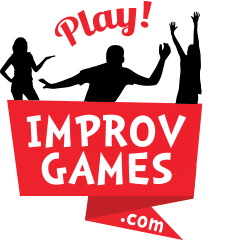What did we learn in a 4 day workshop with about 20 people interested in learning how to make their time improvising on stage less stressful? How to make it effortless?
Rebecca Stockley and I lead the workshop at BATS Improv and here is what we uncovered:
- Breathe
- Say what’s obvious
- Trust your gut
- Say what you notice
- Repeat what they said
- Have a reaction
It’s possible that stress is a choice. It may be that we can tell stories and co-create without effort.
Have you ever been stuck in traffic? I suggest you haven’t. You may have been IN traffic… but you brought the STUCK. ~Dave Razowsky
You may never need these tips… but when you see the warning light on your improv dashboard light up… you can always take a deep breath.
Breathe
A Breath can unlock a body that is stuck. Flight and Fight are not the only reactions when you are fearful…you can also become a Deer-in-the-headlights. A breath activates the whole body. Breath has been spiritual practice for hundreds of years. And it is a reaction (an offer) that will take the place of dialogue.
A deep breath is a line of dialogue that the audience writes. ~William Hall
Say what’s obvious
Saying what’s obvious can take almost no effort. We tend to dismiss it out-of-hand because it doesn’t seem special or good… or because we discount what’s easy. The audience sees everything and if it’s obvious to you it will be obvious to them… they will enjoy it. Besides, obvious is fast… Sometime creativity is called Thinking-out-of-the-box. I suggest you play inside the box.
An artist who is inspired is being obvious. He’s not making any decisions, he’s not weighing one idea against another. He’s accepting his first thoughts. ~Keith Johnstone
Trust your Gut
Sometimes it’s just about saying and doing what you think needs to be said or done. Just do it and see if it’s more effortless. One tiny word of caution: if we are fearful then our gut will give us survival tactics… which will eventually lead to aggression.
Fear produces aggression. ~Keith Johnston
Say what you notice
This is related to the Meisner style of acting which is designed to get the actor out of his/her head and into the moment. Into the emotional truth of the moment. It is powerful to simply say what you notice, particularly in reference to the other actors or yourself. And it’s stress free.
Repeat what they say
Repeating what they say may not feel very clever… but it is almost always helpful to the moment. It makes what was just said important. It is like a line of dialogue.
Have a reaction
Being changed by what someone says is what the audience is looking for. Everything done on the stage affects the other characters. Sometimes when we are fearful we limit our reaction (it’s a survival technique)… but it’s helpful to know that the audience is looking for it. Which means you just have to react… you don’t even need to know why… the audience will be engaged and you and the other actor will figure it out.
Fall, then figure out what to do on the way down. ~Del Close

Bonus list
Here are a few other things on our list that can lead to effortless storytelling:
- Eye contact – Looking at your partner will keep you present and may give you an idea.
- You are not alone – you have your own beautiful brain full of ideas, you have your partner, the environment and the audience.
- Slow it down – Slow is rarely wrong. Slowing the scene down implies deeper emotion.
- You have options (yes/no) – Avoid the trap of following a “yes” rule in improv. Sometimes the answer is no.
- It’s okay to have nothing – Embrace the ‘nothing’ with confidence and it will seem like something to the audience. And you will avoid the effort of ‘pushing.’
- Your head can take you away from what’s around you – When you think ahead about what to do or say, you leave the moment. It can be helpful to realize that your head will try to do this over and over again. After all, that skill has been very good for your survival – it is less helpful to the artist.

These are excellent. So often we completely forget to breathe and give in to the obvious, natural moment. Thanks for reminding us all. We need articles like this! Must have been a great workshop.
Great advice. Now it’s about putting it into practice.